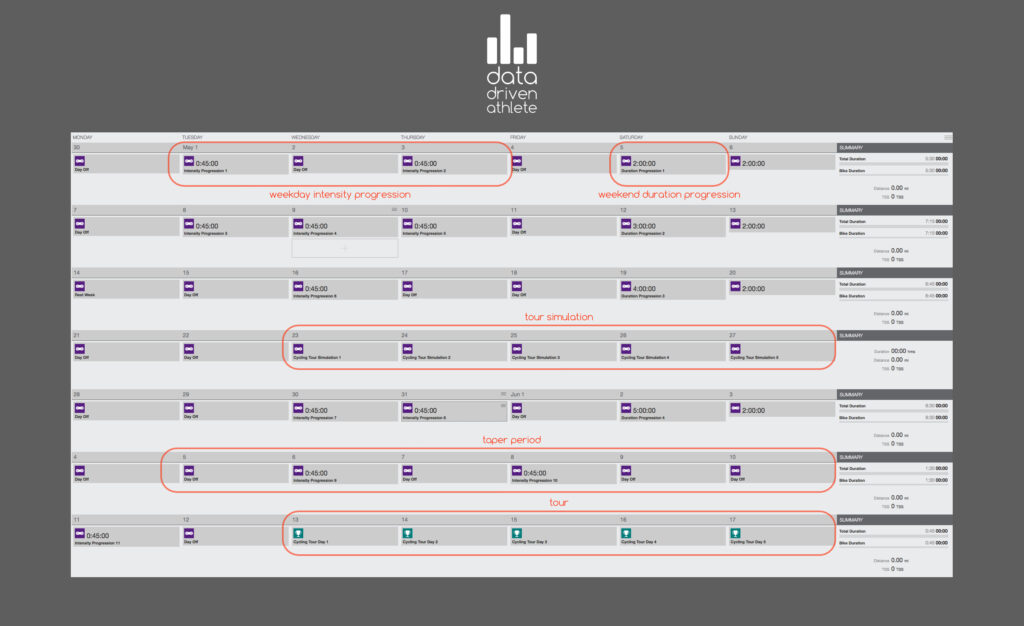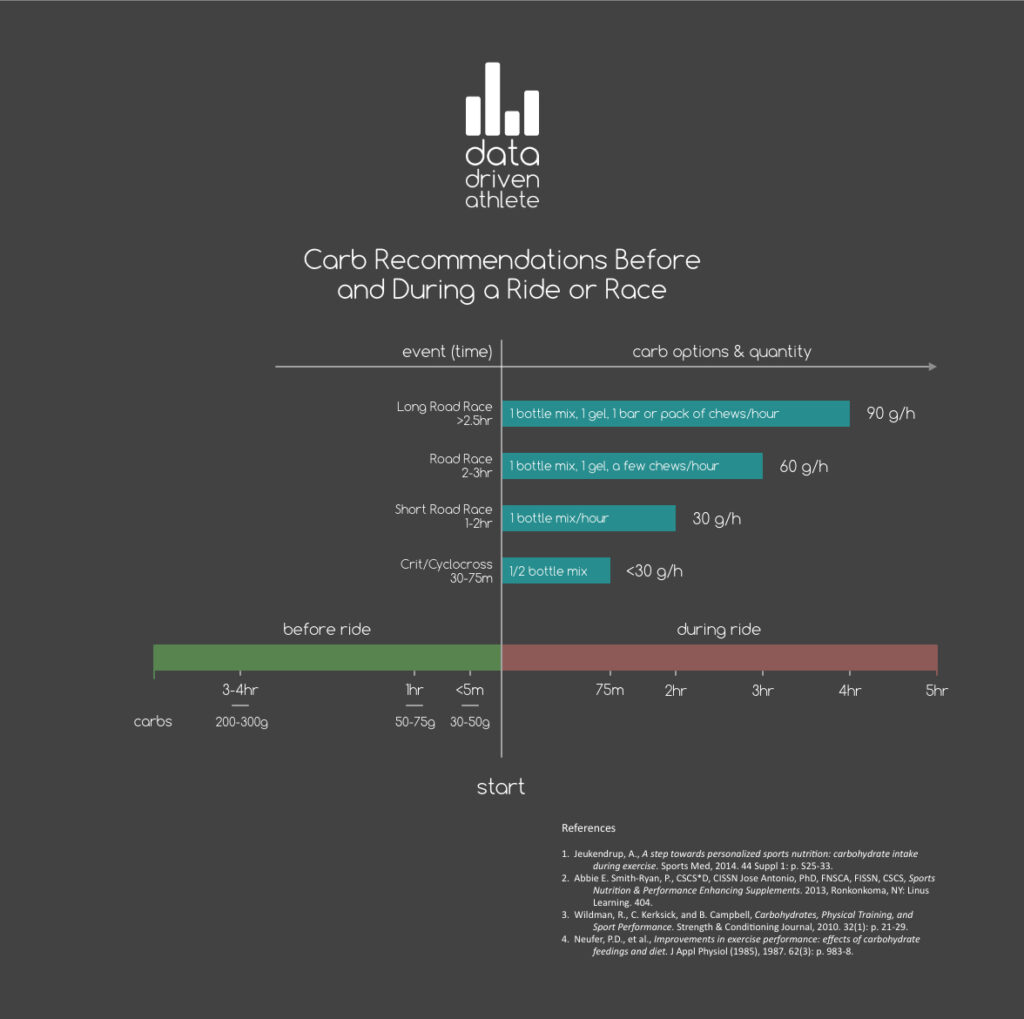If you’ve recently signed up for a bike tour, stage race, or other multi-day cycling event you might be unsure about how best to prepare. In this post we’ll lay out a clear training strategy to make sure you arrive with fresh legs and the fitness to propel you to a strong finish.

Understand the Demands
Start by answering these questions:
- How many days will you be riding? What’s the longest block of back-to-back riding?
- What’s the distance/expected duration of each day including elevation gain/loss? Is there a “queen stage” you’ll want to prepare for differently?
- What’s the typical temperature range on your rides? How about the starting elevation?
Take these answers and construct a picture of exactly what your tour entails. The more details you collect, the more closely you’ll be able to align your training plan with the demands of your tour.
Ride Consistently
The single best way to prepare for an upcoming multi-day cycling event is to ride consistently. Two ways to make sure your training happens:
- Improve your time management. The better you are at managing your time, the more likely you’ll be to make every rides. Getting Things Done, by David Allen, presents a simple and intuitive system that can transform how you manage your time. Essentially, you’ll want to plan well ahead and commit to spending time on your training.
- When you can’t go long, go hard. Yes, slower Zone 2 type rides will improve your fitness [3], but if you’re crunched for time there’s no better way to improve all facets of your cycling than high intensity training [4]. Think you don’t have enough time to train?Even just a focused 10-minute ride (including warmup and cool down) can help keep you on track [5].

Use a Calendar To Create More Focused Training
Sketching a plan on a calendar should be your next step. The TrainingPeaks (TP) platform is a great tool to make your planning simple and flexible. You can even get started for free. Here’s how to make it work for you:
- Start by entering the event date in your TP account. Check out this short tutorial for extra help.
- Enter your available training time for each day of the week. Check out this short tutorial for extra help.
- Match progressively more challenging workouts to your available training time. The graphic below is a nice guide:

- If you’re crunched for time, your training focus should be progressively riding with more intensity, or riding intensely for progressively longer durations. On the other hand, if your ride schedule is wide open, your progression should have a blend of intensity and distance/duration (often referred to as volume).
- 3-4 weeks before your start, try to string together a series of rides similar in volume/intensity to your tour. Again, if you can’t fit in longer rides, focus instead on nailing high intensity workouts in a sequence similar to your tour (see graphic below).

In the final 1-2 weeks (taper period) before your multi-day cycling event, remember to reduce your overall training volume (to shed residual fatigue) while maintaining training intensity (to maintain or slightly improve fitness) [1].
Practice Your Nutrition and Hydration
Chances are there’s room for improvement when it comes to your fueling strategy. Here are a few highlights to ensure you’ve got your nutrition dialed before your tour:
Match your carbohydrate intake to the duration and intensity of your ride [10].

To take a deeper look at fueling for an event, please check out this article. For a quick snap shot check out the graphic below.
Think About Environment and Intensity
Check out this article for an in-depth look at developing your own hydration strategy for a multi-day cycling event. If you’re looking for a single piece of advice, make sure to start your ride fully hydrated, then drink to thirst [11].
Practice!
Before you experiment with a new fueling strategy, make sure you’re regularly practicing your nutrition in the lead up to your tour. The gut, just like other working muscle, is trainable [10, 12]. The more you practice your fueling strategy in advance, the better you’ll be on event day.
Recover
Fueling for the next ride in your tour starts as soon as soon as you’re finished with the ride for the day. For long multi-day tours a high carbohydrate approach (≈10g/kg body mass/day) is essential [13]. Make sure you have plenty of supplementary carbs on hand (my favorite is a pot of rice) to fill in the cracks if you’re still hungry after or between meals.
Take Care of Yourself
- Acclimate to the environment. If your cycling tour is taking place in a warmer climate or at higher elevation, try overdressing on rides [6, 7] or taking a hot bath immediately after rides [8] every 3 days for 10-14 days before your tour. Acclimating to heat in advance of your tour is a great strategy to make sure you’re prepared for hot weather or higher elevation [9].
- Get more sleep. A recent study showed those who slept under 5 hours a night were over 4 times more likely to catch a cold than those sleeping more than 7 hours a night [2]. If you expect to be healthy enough to stay on the bike, start by getting more sleep.
Put it all Together
With a bit of planning and hard work you should be well on your way to enjoying the best multi-day cycling event of your life!
References
Ely, B.R. et al. (2018, June). Physiological Responses to Overdressing and Exercise-Heat Stress in Trained Runners. Retrieved from https://pubmed.ncbi.nlm.nih.gov/29319584/
Gibala, M.J. et al. (2006, July 6). Short-term sprint interval versus traditional endurance training: similar initial adaptations in human skeletal muscle and exercise performance. Retrieved from https://www.ncbi.nlm.nih.gov/pmc/articles/PMC1995688/
Gibson, O.R. et al. (2017, September). Cross-Adaptation: Heat and Cold Adaptation to Improve Physiological and Cellular Responses to Hypoxia. Retrieved from https://pubmed.ncbi.nlm.nih.gov/28389828/
Gillen, J.B. et al. (2014, November 3). Three minutes of all-out intermittent exercise per week increases skeletal muscle oxidative capacity and improves cardiometabolic health. Retrieved from https://pubmed.ncbi.nlm.nih.gov/25365337/
Goulet, E.D.B. (2012, November). Dehydration and endurance performance in competitive athletes. Retrieved from https://pubmed.ncbi.nlm.nih.gov/23121348/
Jeukendrup, A. (2014, May 3). A step towards personalized sports nutrition: carbohydrate intake during exercise. Retrieved from https://www.ncbi.nlm.nih.gov/pmc/articles/PMC4008807/
Lucia, A. et al. (2000, June). Metabolic and neuromuscular adaptations to endurance training in professional cyclists: a longitudinal study. Retrieved from https://pubmed.ncbi.nlm.nih.gov/11016988/
Miall, A. et al. (2017, June 19). Two weeks of repetitive gut-challenge reduce exercise-associated gastrointestinal symptoms and malabsorption. Retrieved from https://pubmed.ncbi.nlm.nih.gov/28508559/
Mujika, I., Intense training: the key to optimal performance before and during the taper. Retrieved from https://pubmed.ncbi.nlm.nih.gov/20840559/
Prather, A.A., et al. (2015, September 1). Behaviorally Assessed Sleep and Susceptibility to the Common Cold. Retrieved from https://pubmed.ncbi.nlm.nih.gov/26118561/
Stevens, C.J. et al. (2017, October 9). Acute physiological and perceptual responses to wearing additional clothing while cycling outdoors in a temperate environment: A practical method to increase the heat load. Retrieved from https://pubmed.ncbi.nlm.nih.gov/29435480/
Williams, C. (2004, October). Carbohydrate intake and recovery from exercise. Retrieved from https://www.sciencedirect.com/science/article/abs/pii/S076515970400053X
Zurawlew, M.J. et al. (2015, December 9). Post-exercise hot water immersion induces heat acclimation and improves endurance exercise performance in the heat. Retrieved from https://pubmed.ncbi.nlm.nih.gov/26661992/



